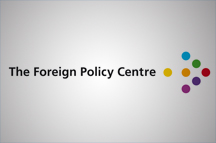 This Westminster Seminar will examine the work of a range of international institutions active in the former Soviet Union including the Council of Europe, OSCE, EU,CIS, UN, EITI, Interpol and the international financial institutions, looking at how they respond to the major human rights challenges in the region. It will act as the launch event for a new FPC publication bringing together essays examining these issues from a range of experts.This seminar is the first component of a major new FPC project entitled Exporting Repression, kindly supported by the Open Society Foundations.
This Westminster Seminar will examine the work of a range of international institutions active in the former Soviet Union including the Council of Europe, OSCE, EU,CIS, UN, EITI, Interpol and the international financial institutions, looking at how they respond to the major human rights challenges in the region. It will act as the launch event for a new FPC publication bringing together essays examining these issues from a range of experts.This seminar is the first component of a major new FPC project entitled Exporting Repression, kindly supported by the Open Society Foundations.
Institutionally Blind will explore the ways in which human rights activists and governments from the former Soviet Union region operate within and towards these organisations to promote their own positions and challenge each others narratives. It will examine how Western Governments and parliamentarians engage with and work through these organisations, looking at how their domestic political debates, such as around the UK's relationship with the European Convention on Human Rights, influence the behaviour of authoritarian regimes in the region towards these institutions.
The seminar will look at both the bureaucratic and parliamentary dimensions of these institutions, exploring the capacity problems faced by the officials at institutions such as the EU External Action Service, European Commission, the OSCE's Office for Democratic Institutions and Human Rights, the European Court of Human Rights and the bureaucratic functions of the Council of Europe, such as the Commissioner for Human Rights. It will look at how they prioritise scrutiny of human rights and governance compared to other diplomatic, economic and security priorities. The seminar will look at how European politicians respond to human rights and governance challenges in the former Soviet Union through bodies such as the Parliamentary Assembly of the Council of Europe, the OSCE Parliamentary Assembly, the CIS Parliamentary Assembly and the EU's committees, delegations and forums such as Euronest. It will look at allegations of politicians accepting inducements from autocratic regimes ('caviar diplomacy'), the role of pan-European party groups, lobbying organisations and debates around the merits of political engagement vs public criticism of poor performance. It will also examine some of the tensions around the role of parliamentarians in election observation.
The seminar will also look at the role of global institutions, particularly the UN and international financial institutions. It will explore the role of the UN Human Rights Council, its Universal Periodic Review (UPR) of human rights standards and the extent to which UN special rapporteurs are allowed access to countries in the region and what impact their visits and subsequent reports can have. The seminar will examine the ways in which economic institutions such as the World Bank, regional development banks and EITI operate in the region, looking at the challenges they face working with countries with poor records on governance and transparency.
Speakers:
- Rt Hon Dominic Grieve QC MP, Chair, APPG on the Rule of Law and former Attorney General
- Anna Chernova, Senior Regional Policy Coordinator, Middle East/Eurasia, Oxfam
- Tinatin Tsertsvadze, International Advocacy Manager, International Partnership for Human Rights
- Adam Hug, Policy Director, Foreign Policy Centre
- Further speaker to be confirmed shortly
Chair:
Luke Harding, Foreign Correspondent, The Guardian












